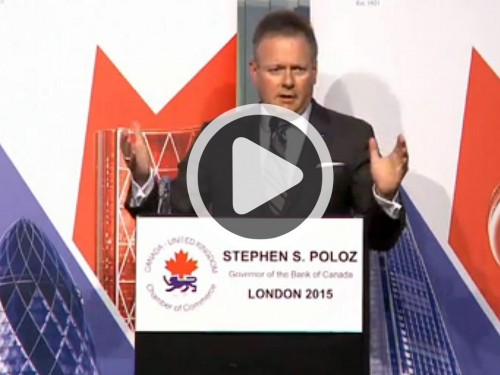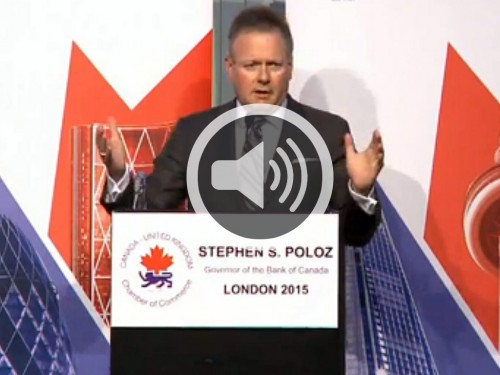Financial volatility a natural consequence of monetary policy normalization, says Bank of Canada Governor Stephen S. Poloz
The recent rise in financial market volatility reflects a global economy that is beginning the process of getting back to normal, Bank of Canada Governor Stephen S. Poloz said on Thursday.
In a speech to the Canada-United Kingdom Chamber of Commerce, Governor Poloz discussed the recent rise in financial market volatility and low long-term bond yields, and what they both might mean for central bank credibility.
The recovery from the Great Recession has been slow and uneven, and long-term interest rates are well below central banks’ inflation targets, the Governor said. Financial market volatility has increased broadly, as economies and policies diverge and the prospect of policy normalization becomes more real.
The Governor noted that low long-term bond yields reflect a combination of a declining neutral interest rate and a lower term premium, the latter due to actions taken by central banks to foster stronger growth in pursuit of their inflation targets. Meanwhile, inflation expectations have remained solid in Canada and in many other jurisdictions. “As we have seen, well-anchored inflation expectations reflect the unwavering pursuit of our inflation goals,” the Governor said. “Measured in this way, it is clear to me that our credibility is intact.”
Unconventional monetary policies, including quantitative easing and forward guidance used in the wake of the crisis, gave investors more certainty around the trading of certain assets and suppressed financial market volatility, with good results, Governor Poloz said. However, as the global recovery continues and central banks gradually return to more conventional policy making, greater financial market volatility is to be expected. Volatility “has begun to return closer to historical averages, not abnormal levels,” he said.
In normal times, volatility happens and it must go somewhere, the Governor said, and it is the job of a central bank to keep that volatility from landing on economic growth and inflation. When shocks to the economy occur, “higher financial market volatility is a natural consequence, an integral part of the economy’s equilibration process,” he said. “Such financial volatility is neither inherently bad nor good.”
The Bank will continue to follow policies necessary to ensure a timely return of inflation to its target, he said. “Ultimately, our credibility will hinge on how well we meet our mandate,” Governor Poloz said. “I’m confident that we will continue to get the job done.”

